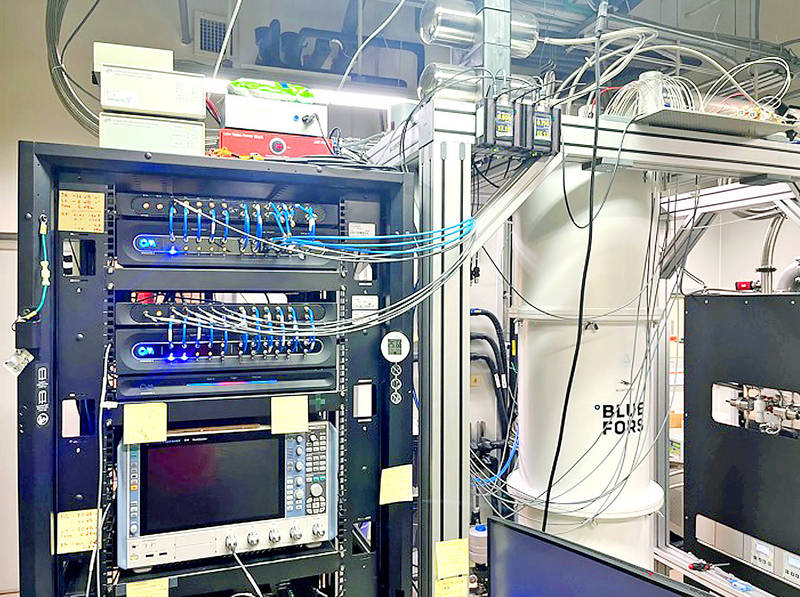《TAIPEI TIMES》 Taiwan eyes 2027 for first local quantum computer

A bag of Kuaikuai snacks, commonly used by Taiwanese tech workers as a lucky charm against computer malfunctions, lies on top of a quantum computer prototype utilizing 5-quantum-bit chips in an undated photograph. Photo courtesy of Chen Chi-tung, Institute of Physics, Academia Sinica
RACE IS ON: As it would likely take another six years for quantum computing to mature, Taiwan has an opportunity to gain a foothold in the industry, an NSTC official said
By Wu Po-hsuan and Jake Chung / Staff reporter, with staff writer
Taiwan aims to produce its first domestically developed quantum computer by 2027, the National Science and Technology Council (NSTC) said yesterday.
Quantum computing is the most anticipated next-stage development for raw computational power, said Luo Meng-fan (羅夢凡), head of the NSTC’s Department of Natural Sciences and Sustainable Development.
The council has been working with the Ministry of Economic Affairs, Academia Sinica and other research organizations to realize a five-year, NT$8 billion (US$258.86 million) quantum technology plan that began in 2022, it said.
A Google study published in July last year showed how a random circuit sampling task that would have taken a classical supercomputer 47 years to complete was finished in just 6.18 seconds on the latest version of its Sycamore processor, which had been boosted to 70 quantum bit (qubits), Luo said.
In quantum computing, a random circuit sample task tests quantum computer performance by running random circuits and evaluating its capabilities and efficiency in solving complex problems.
With such powerful computational capabilities, security experts have warned that one day — dubbed “Q Day” — quantum computers would be able to crack codes protecting digital data, Luo said.
Measures to counter such development include quantum cryptography, such as quantum key distribution, he said.
However, quantum computers are still affected by high error rates, he said, adding that the technology needs another six years of research and development to reach maturity, when it could make a global impact.
That is why it is crucial for Taiwan to develop quantum computers to retain a foothold in critical technologies, he said.
The NSTC’s collaboration with academia and other sectors would flesh out the component supply chain for building quantum computers and shorten the time necessary when transitioning the supply chain for commercial purposes, Luo said.
Taiwan is not alone in rushing to develop quantum computers, he said.
Taiwanese researchers are in talks with Finnish quantum computing hardware company IQM to establish testing platforms in Taiwan, he said.
Four cloud software computational platforms are utilizing the quantum cloud computation services offered by IBM, Amazon and other international companies, he added.
Academia Sinica is to provide some of its newly developed 5-qubit chips for trials at research facilities later this month, said Lee Chau-hwang (李超煌), executive secretary of the institute’s Central Academic Advisory Committee.
Taiwan has only started developing quantum chipsets, but is closely monitoring increasing chipset yield rates, Lee said.
“Yield rates are key for mass production,” he said.
新聞來源:TAIPEI TIMES














